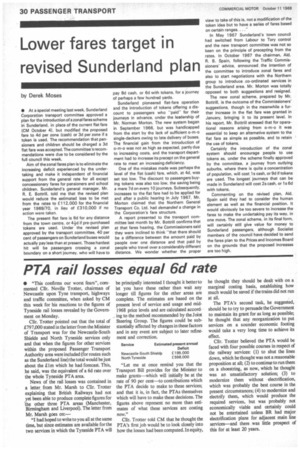Lower fares target in revised Sunderland plan
Page 32

If you've noticed an error in this article please click here to report it so we can fix it.
by Derek Moses
• At a special meeting last week, Sunderland Corporation transport committee approved a plan for the introduction of a zonal fares scheme in Sunderland, in place of the current flat fare (CM October 4), but modified the proposed fare to 4d per zone (cash) or 3d per zone if a token is used. The recommendation that pensioners and children should be charged a 3d flat fare was accepted. The committee's recommendations were due to be considered by the full council this week.
Aim of the zonal fares plan is to eliminate the increasing deficit experienced by the undertaking and make it independent of financial support from the general rate for all except concessionary fares for pensioners and school children. Sunderland's general manager, Mr. R. E. Bottrill, told me that the revised plan would reduce the estimated loss to be met from the rates to £112,000 for the financial year 1969/70, in lieu of £310,000 if no action were taken.
The present flat fare is 6d for any distance from the town centre, or 44-d if pre-purchased tokens are used. Under the revised plan approved by the transport committee, 40 per cent of passengers on Sunderland buses would actually pay less than at present. Those hardest hit will be passengers crossing a zonal boundary on a short journey, who will have to pay 8d cash. or 6d with tokens, for a journey of perhaps a few hundred yards.
Sunderland pioneered flat-fare operation and the introduction of tokens offering a discount to passengers who "paid" for their journeys in advance, under the leadership of Mr. Norman Morton. The new system began in September 1966, but was handicapped from the start by the lack of sufficient o-m-o single-deckers owing to late delivery of buses. The financial gain from the introduction of o-m-o was not as high as expected, partly due to increasing costs, and the transport department had to increase its precept on the general rate to meet an increasing deficiency.
One of the mistakes made was perhaps the level of the flat (cash) fare, which. at 4d, was set too low. The discount to passengers buying tokens was also too low, the saving being a mere 7d on every 10 journeys. Subsequently. increases to the flat fare had to be applied for and after a public hearing in July 1967, Mr. Morton claimed that the Northern General Transport Co. Ltd. had demanded a change in the Corporation's fare structure.
A report presented to the transport committee last month by Mr. Bottrill confirms that at that fares hearing, the Commissioners said they were inclined to think "that there should be a difference between the amount paid by people over one distance and that paid by people who travel over a considerably different distance. We wonder whether the proper view to take of this is, not a modification of the token idea but to have a series of fares based on certain ranges...."
In May 1967 Sunderland's town council had switched from Labour to Tory control and the new transport committee was not so keen on the principle of precepting from the rates. In October 1967 the chairman, Ald. R. B. Spain, following the Traffic Commissioners' advice, announced the intention of the committee to introduce zonal fares and also to start negotiations with the Northern group to introduce co-ordinated services in the Sunderland area. Mr. Morton was totally opposed to both suggestions and resigned.
The new zonal scheme, prepared by Mr. Bottrill, is the outcome of the Commissioners' suggestions, though in the meanwhile a further increase in the flat fare was granted in January. bringing it to its present level. In his report, Mr. Bottrill stressed that for operational reasons arising from o-m-o it was essential to keep an alternative system to the flat fare as simple as possible, and to retain the use of tokens.
Certainly the introduction of the zonal system should encourage people to use tokens as, under the scheme finally approved by the committee, a journey from outlying suburbs, where there is quite a concentration of population, will cost 1s cash, or 9d if tokens are used. The longest journeys that can be made in Sunderland will cost 2s cash. or 1s 6d with tokens.
Commenting on the revised plan, Ald. Spain said they had to consider the human element as well as the financial position. It would obviously be too severe to increase the fares to make the undertaking pay its way. in one move. The zonal scheme, in its final form, will certainly still give value for money to Sunderland passengers, although Socialist members of the council have decided to send the fares plan to the Prices and Incomes Board on the grounds that the proposed increases are too high.












































































































